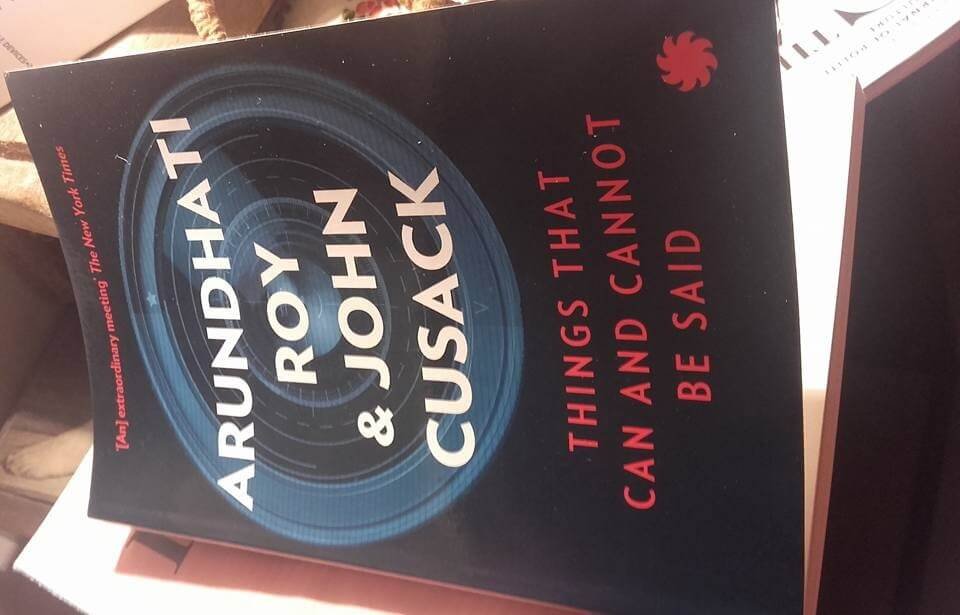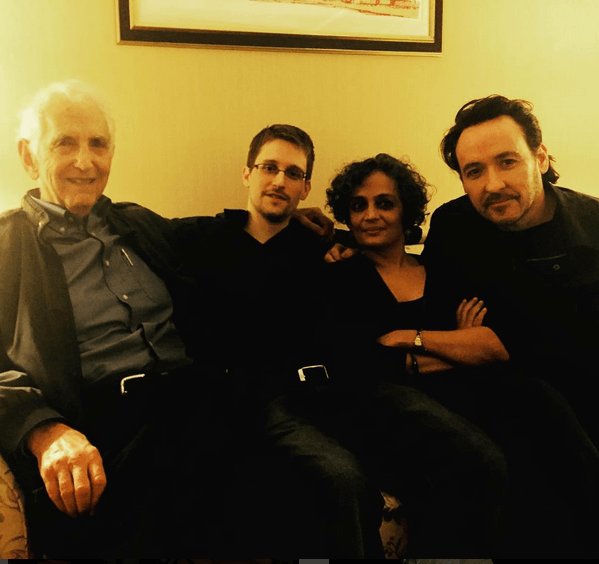“This! Just arrived at my doorstep and has thrown all other books off the shelf. Cannot put it down!” is what I posted prematurely on Facebook when my copy of Arundhati Roy’s new book arrived.
“Arundhati Roy and John Cusack – Things That Can And Cannot Be Said.” Bold type on a cover that looks a bit like an LP. I was very excited.
I’ve been a fan of Arundhati Roy since The God Of Small Things and have maintained until now that I am exactly on her side politically; only I wished she didn’t always sound so indignant. To friends and like-minded comrades, I’d say – “If she really wants to reach beyond people like herself then her tone must change”.

Now I am angry. Almost as angry as she is when she writes her invective and polemic. After I was done with this treatise, my hackles rose as I said to myself, what did I post on Facebook! This is pure, unadulterated faff. It was sold as a book in which Hollywood actor John Cusack picked up the phone to ask Arundhati Roy if she’d want to meet Edward Snowden in Russia, along with the man who was the Snowden of the 60s – Daniel Ellsberg. It was Ellsberg who leaked the Pentagon papers during the Vietnam war. But when the book ends on page 109, you will discover it has almost no conversation and no quotes from Snowden and hardly any wisdom from Ellsberg.
105 of the 109 pages are only polemic. Recorded conversations that Roy and Cusack have about the world, its fucked up capital and the new great game between the US homeland security, the CIA and their machinations in Iraq, Libya, Syria et al. Nothing new.

And that’s precisely the point. If we want to preserve and spread left-wing liberalism in which we are all invested; if we truly believe, then we can’t carry on with a simple and simplistic rant, then polemic just doesn’t cut it. We need to actually tell stories, have inclusive conversations that at least TRY and reach the marginal – people who may like to join the tribe but aren’t sure how or why.
If everything you write Ms Roy is only about telling the rest how trivial they are, what cretins they are, you are reducing them and confining them to their cretinism. And frankly, it’s just tiring and boring for the rest of us to read. There is no new catharsis, no fresh insights and actually no conversation with the said Snowden at all.
In the end, Roy seems caught up in the image and dare I use the word “brand” she sells – herself as the arbiter of all things right and righteous. We hear nothing from Snowden, save for Roy’s pronouncement of him as the good guy. With pompous lines such as the following: “He’s not just a systems man. That’s what I needed to know.” And just who are you to be this contemptuous of “systems men”, I would like to ask. You cannot do that without implicating yourself Ms Roy, as you type on a keyboard powered by those systems. I am not suggesting at all that this does not give you the right to critique capital or to be the powerful dissenter you are. I admire that. But let it not be an increasingly repetitive rant that begins to ring hollow.
Implicate yourself when you speak. Include those you condemn in every word you put down and see if you can reach out to even one of them. That’s much more powerful writing and much harder to do. It takes us all away from the stasis and corner we’re painting ourselves into. In the end, this pamphlet – because it certainly isn’t a book in my eyes – can be summed up in 12 words. “In Which Four Cool People Met And Absolutely Nothing Came Of It.”

















